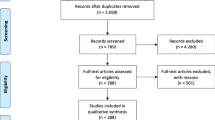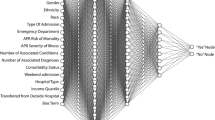Abstract
The rapid development of machine learning (ML) applications in healthcare promises to transform the landscape of healthcare. In order for ML advancements to be effectively utilized in clinical care, it is necessary for the medical workforce to be prepared to handle these changes. As physicians in training are exposed to a wide breadth of clinical tools during medical school, this offers an ideal opportunity to introduce ML concepts. A foundational understanding of ML will not only be practically useful for clinicians, but will also address ethical concerns for clinical decision making. While select medical schools have made effort to integrate ML didactics and practice into their curriculum, we argue that foundational ML principles should be taught broadly to medical students across the country.

Similar content being viewed by others
References
Steiner DF, Nagpal K, Sayres R, Foote DJ, Wedin BD, Pearce A, et al. Evaluation of the use of combined artificial intelligence and pathologist assessment to review and grade prostate biopsies. JAMA Netw Open [Internet]. 2020;3. Available from: https://www.ncbi.nlm.nih.gov/pmc/articles/PMC7662146/. Accessed 5 Jan 2021.
Buetti-Dinh A, Galli V, Bellenberg S, Ilie O, Herold M, Christel S, et al. Deep neural networks outperform human expert’s capacity in characterizing bioleaching bacterial biofilm composition. Biotechnol Rep (Amst) [Internet]. 2019;22. Available from: https://www.ncbi.nlm.nih.gov/pmc/articles/PMC6430008/. Accessed 21 Jan 2021.
Morrow JM, Sormani MP. Machine learning outperforms human experts in MRI pattern analysis of muscular dystrophies. Neurology. 2020;94:421–2.
Kolachalama VB, Garg PS. Machine learning and medical education. NPJ Digital Med. Nat Publishing Group. 2018;1:1–3.
Sarwar S, Dent A, Faust K, Richer M, Djuric U, Van Ommeren R, et al. Physician perspectives on integration of artificial intelligence into diagnostic pathology. NPJ Digital Med. Nat Publishing Group. 2019;2:1–7.
Health C for D and R. Artificial intelligence and machine learning in software as a medical device. FDA [Internet]. FDA. 2021. Available from: https://www.fda.gov/medical-devices/software-medical-device-samd/artificial-intelligence-and-machine-learning-software-medical-device. Accessed 21 Jan 2021.
2019 Council on Medical Education. Augmented intelligence in health care: medical education, professional development and credentialing. Am Med Assoc. 2019.
Carson PL, Fenster A. Anniversary paper: evolution of ultrasound physics and the role of medical physicists and the AAPM and its journal in that evolution. Med Phys. 2009;36:411–28.
Paranjape K, Schinkel M, Panday RN, Car J, Nanayakkara P. Introducing artificial intelligence training in medical education. JMIR Med Educ. 2019;5:e16048.
Smulyan H. The computerized ECG: friend and foe. The American Journal of Medicine Elsevier. 2019;132:153–60.
Amann J, Blasimme A, Vayena E, Frey D, Madai VI. Explainability for artificial intelligence in healthcare: a multidisciplinary perspective. BMC Med Inform Decis Mak [Internet]. 2020;20. Available from: https://www.ncbi.nlm.nih.gov/pmc/articles/PMC7706019/. Accessed 21 Jan 2021.
Gianfrancesco MA, Tamang S, Yazdany J, Schmajuk G. Potential biases in machine learning algorithms using electronic health record data. JAMA Intern Med. 2018;178:1544–7.
Obermeyer Z, Powers B, Vogeli C, Mullainathan S. Dissecting racial bias in an algorithm used to manage the health of populations. Science. 2019;366:447–53.
Amazon scraps secret AI recruiting tool that showed bias against women | Reuters [Internet]. Available from: https://www.reuters.com/article/us-amazon-com-jobs-automation-insight/amazon-scraps-secret-ai-recruiting-tool-that-showed-bias-against-women-idUSKCN1MK08G. Accessed 2 Nov 2021.
McCoy LG, Nagaraj S, Morgado F, Harish V, Das S, Celi LA. What do medical students actually need to know about artificial intelligence? NPJ Digit Med [Internet]. 2020;3. Available from: https://www.ncbi.nlm.nih.gov/pmc/articles/PMC7305136/. Accessed 5 Jan 2021.
Artificial Intelligence in Healthcare Accelerated Program [Internet]. Available from: https://aihap.mgh.harvard.edu/program-info/. Accessed 21 Jan 2021.
Brouillette M. AI added to the curriculum for doctors-to-be. Nat Med Nat Publishing Group. 2019;25:1808–9.
Buja LM. Medical education today: all that glitters is not gold. BMC Med Educ. 2019;19:110.
Kollmer Horton ME. The orphan child: humanities in modern medical education. Philos Ethics Humanit Med. 2019;14:1.
Skochelak SE, Stack SJ. Creating the Medical Schools of the Future. Acad Med. 2017;92:16–9.
Funding
No funding for this work.
Author information
Authors and Affiliations
Contributions
All the authors contributed to development of the argument, drafting and editing of the manuscript, and final approval.
Corresponding author
Ethics declarations
Ethical Approval
NA.
Informed Consent
NA.
Conflict of Interest
Aziz Nazha, Honoraria: DCI, Consulting or Advisory Role: Karyopharm Therapeutics, Tolero Pharmaceuticals, Speakers’ bureau: Novartis, Incyte, Stock ownership: Amazon.
Additional information
Publisher's Note
Springer Nature remains neutral with regard to jurisdictional claims in published maps and institutional affiliations.
Rights and permissions
About this article
Cite this article
Nagy, M., Radakovich, N. & Nazha, A. Why Machine Learning Should Be Taught in Medical Schools. Med.Sci.Educ. 32, 529–532 (2022). https://doi.org/10.1007/s40670-022-01502-3
Accepted:
Published:
Issue Date:
DOI: https://doi.org/10.1007/s40670-022-01502-3




